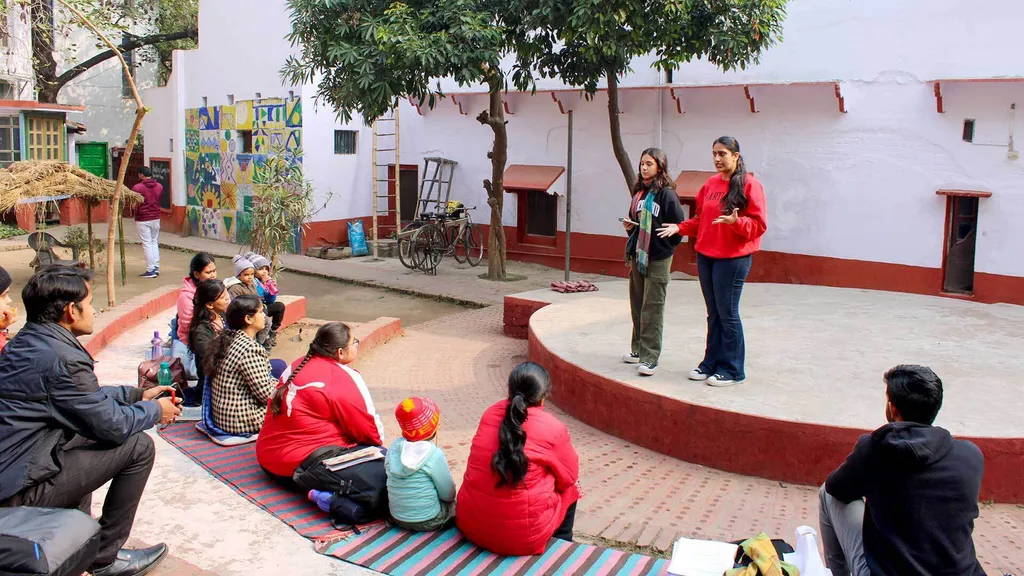- April 05, 2024
- By Karen Shih ’09
It can be as simple as a high-five from a kid while prepping an anti-bullying workshop in Prince George’s County. Or seeing a family equipped with tools like mosquito nets to reduce their malaria risk in Sierra Leone.
“It’s so rewarding to volunteer in these communities,” said biological sciences major Meghna Pandey ’24, co-president of the University of Maryland’s Public Health Beyond Borders—the first organization of its kind at an American college.
Now celebrating its 10th anniversary, PHBB was the brainchild of former School of Public Health Dean Jane Clark, who was inspired by the work of Engineers Without Borders (EWB). Today, about 50 undergraduate and graduate students of various majors work to reduce health disparities by educating people in communities around the world.
“Every time I travel with our students, I’m so impressed with the work they put in,” said Clinical Professor of family science Elisabeth Maring. She has advised the group since its inception and led its first trip to Peru in partnership with EWB, where the engineers built a water chlorination system while the public health students surveyed the local community on health needs.
PHBB now works in four countries internationally—Peru, Sierra Leone, Kenya and India—as well as locally in Prince George’s County. Students conduct wide-ranging needs assessment interviews on a variety of public health issues, including mental health, stress, nutrition, physical activity, and access to hospitals and medical care. Then, based on the results, they design workshops to help address health needs within the communities.
About 15 students join each project. International teams take one trip each year, during either winter or summer break, and throughout the school year, they fundraise, prepare assessment and workshop materials, and study cultural differences.

In Sierra Leone, for example, students have held malaria and handwashing workshops, as well as supported a teen mothers’ program. In India, in collaboration with Banaras Hindu University in Varanasi, PHBB focused on first aid, peer relationships, and stress management, including creating DIY stress balls.
“I was really inspired by the people we met in India, including powerful activists who work to stop violence against women,” said Pandey.
The PHBB local team works in Prince George’s County year-round, presenting several workshops per semester to kids ages 6-13 on topics like healthy relationships and bullying, based on suggestions from school counselors, including those at nearby College Park Academy.
“Interaction is key,” said public health major Om Desai ’26, one of the local project leaders. “We love to involve games and activities so students will participate.”
That’s a key aspect of public health, said co-leader biological sciences major Sai Badugu ’26. “When you’re trying to disseminate information, you want to make sure you’re doing it in a way that is appropriate for your target audience—kind of like sneaking the vegetables in.”
PHBB has spread beyond UMD. Several alums have incorporated it into a national nonprofit, creating a toolkit of workshops for new chapters to use, including those at Temple University in Pennsylvania and Daystar University in Kenya.
Volunteering with PHBB is a win-win, said Pandey. Community members gain health knowledge, and UMD students gain skills that will serve them well in their careers, especially since many hope to go into health care.
As an aspiring doctor, she looks forward to “building rapport with patients, considering their backgrounds and cultural values, tailoring individual treatment plans for them,” all thanks to her experience with PHBB.
The Public Health Beyond Borders team will compete at the Do Good Challenge on April 30 as one of six finalists hoping to win a share of more than $20,000 in prizes.
Want to join Public Health Beyond Borders? Meetings are held each Wednesday night from 7-8 p.m. in room 1312 at the School of Public Health. All majors are welcome. Contact phbbumd@gmail.com with questions.
Topics
Campus & CommunityTags
Student ExperienceUnits
School of Public Health